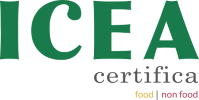EU Organic Farming (Regulation (EC) No. 834/07)
It certifies agricultural products, processed agri-food products, feed and pet food, aquaculture products, algae and microalgae (spirulina), yeasts.
It guarantees the conformity of organic production at all stages of the production chain, from farm to table, in compliance with the EU regulations. (Regulation (EC) No. 834/07 and (EC) No. 889/08)
What it is certified
Feed and Pet Food
The principles and criteria defined in the Regulation for the production of organic feed are similar to those provided for food preparation. In the Regulation (EC) No. 889/08 the few common ingredients, additives and adjuvants permitted, and the rules for labelling are reported.
The feed can only be labelled as ‘organic’ if it contains at least 95% organic feed materials; alternatively, it is possible to label the feed as ‘allowed in organic farming’ by specifying precisely the content in organic, conversion or conventional feed materials.
Also in the case of feed, the use of ionising radiation and any substance resulting from or produced from GMOs is prohibited.
The same ingredient cannot be present in both the organic and conventional versions at the same time.
Organic production shall take place by guaranteeing separate processing over time (thanks to dedicated plants) or in space. In the latter case, the installation shall be adequately cleaned before starting the organic production.
In compliance with art. 42 of (Regulation (EC) No. 834/07), following the approval of the National Specification for the production of animal feed, Pet-Foods may also be certified under Regulation (EC) No. 834/07.
The records shall allow a correct identification and reporting of incoming and outgoing flows of raw materials and finished product. Caterers are not yet subject to the control obligations imposed by the Regulation (EC) No. 834/07.
How to certify
The certification process is divided into five main phases:
- Notification of organic production activity to the competent authority through the Biological Information System (SIB) or similar regional systems. Farms involved in food preparation shall state the production plants where organic preparation in carried out including any subcontractors not directly subject to the control system.
- Initial assessment of the production process, the operator shall submit a management plan to describe all the measures he intends to take to comply with the organic requirements relating to the activity carried out. The operators involved in food preparation and pet food shall provide the Annual Preparation Plan (PAP), the list of organic raw materials suppliers, and the formulations of all those products for which the certification is required.
- Start-up inspection to verify the correct application and effectiveness of declared management plan measures and other related documents. In addition, the suitability of the structures and the correct management of the company’s production processes are assessed as required by the European regulations for the different fields of activity.
- Issue of Documentary Evidence and Certificate of Conformity based on the information and data collected as part of the assessment and verification process. The Certificate of Conformity lists the certified products. The certificate of conformity shall report the list of certified products and their classification according to the production method, ‘organic’ or ‘in conversion’. The labels on the products shall be prior authorised by the ICEA competent office.
- Annual surveillance through periodic inspections and planned analyses based on a careful risk analysis, aimed at confirming the maintenance of compliance conditions and the prompt and accurate keeping of the mandatory records required for control purposes.
Documents and downloadable files
[button color=”green” size=”normal” alignment=”none” rel=”follow” openin=”newwindow” url=”https://www.icea.bio/wp-content/uploads/2017/01/2.-M0202-Regolamento-Tecnico-834-Ed03-Rev00-Certificazione-Biologica-EU-Europa-ICEA-Istituto-di-Certificazione-Etica-e-Ambientale.pdf”]Regulation for Certification[/button]
[button color=”green” size=”normal” alignment=”none” rel=”follow” openin=”newwindow” url=”https://www.icea.bio/wp-content/uploads/2017/01/3.-M0201-Contratto-certificazione-834-Ed02-Rev04-Certificazione-Biologica-EU-Europa-ICEA-Istituto-di-Certificazione-Etica-e-Ambientale.pdf”]Contract for certification [/button]
[button color=”green” size=”normal” alignment=”none” rel=”follow” openin=”newwindow” url=”https://www.icea.bio/wp-content/uploads/2017/01/5.-M0206_Piano-di-gestione-preparatori-Ed03-Rev02-Certificazione-Biologica-EU-Europa-Preparazione-alimentare-ICEA-Istituto-di-Certificazione-Etica-e-Ambientale.docx”]Management Plan[/button]
Contact ICEA
ICEA Piemonte, Liguria e Valle D’Aosta

